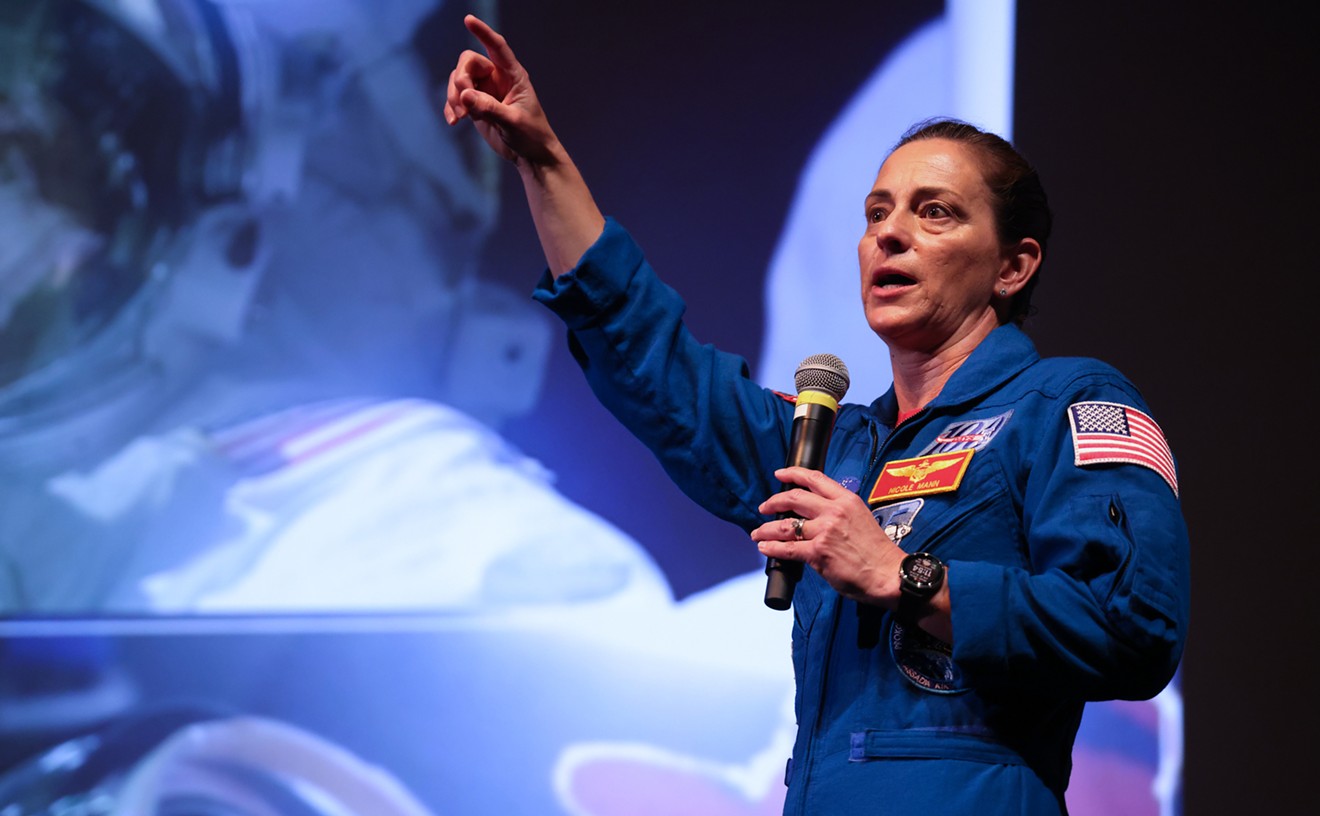Arntzen's peculiar but groundbreaking work has snagged him a seat on President Bush's Council of Advisors on Science and Technology, but he's not above sitting down with an underinformed journalist at a beer-stained table at Armadillo Grill and Bar. I order a bloody mary and try my darnedest to keep up with Arntzen's talk of tomatoes -- and how they will one day save the Third World.
New Times: You're all over the news these days, and everyone's referring to you as a pioneer.
Charlie Arntzen: It's gratifying, but it's mainly because people are beginning to be more interested in these new vaccines as a curiosity, as something quirky.
NT: Well, you have to admit that the notion of an edible vaccine is pretty zany.
Arntzen: But not when you consider that this sort of work is usually funded by government grants, and they're almost always three-year grants, which means you've got a limited amount of time to get the work done and the grant renewed. We had to find something we could put genes into and then quickly get a lot of bio-matter out of, a vaccine that we could then test on animals and later on humans.
NT: And that something was tomatoes.
Arntzen: Yes. We like them because you can make anything from ketchup to pasta sauce. All the technology that the food industry already created tells us how to work with these foods, so we know how to make tomato juice and freeze-dry it, and how to grind it up after we dry it.
NT: So once you perfect this tomato-based vaccine, I can just cook my yearly inoculation into, say, a nice marinara?
Arntzen: No. The word "cook" is taboo, because we're talking about proteins, which lose their structure in cooking. Everything we do is at low temperatures. We make tomato purée and we freeze-dry it, and we end up with a tomato powder, which can then be put into pill form.
NT: You've been working a lot with bananas, too.
Arntzen: We've always worked on bananas, but we haven't yet given a banana to humans, because they take so long to work with three to four years from the time we put a gene into a cell whereas, with potatoes, we put a gene in and, about four months later, we have enough potato to do biological tests on.
NT: So now we're talking about a potato vaccine. Let's call the whole thing off!
Arntzen: Well, we moved into potatoes because we can get a lot of information quickly, but also because there's no regulatory framework for a plant-derived pharmaceutical. We need less approval to work with potatoes than if we had to get approval for clinical trials involving humans, because our subject is considered a food additive.
NT: Rather than a poor kid in a Third World country.
Arntzen: That's why we have to get the vaccine approved here. If we can get one of these vaccines licensed by the FDA, then that debate about using impoverished children will shut down. And then we can help those kids with a vaccine that's easily administered.
NT: So the short version is that we will one day be able to vaccinate ourselves by eating stuff from our own gardens. What does this mean to our salads? I mean, if doctors are hogging tomato crops to prevent illness, your Cobb salad picture is going to be very different.
Arntzen: No. We're very careful to distinguish between garden vegetables and plant-derived vaccines. We're doing this by growing tomatoes that have male sterility; they have no seeds. We're breeding our tomatoes to lose their color. We want tomatoes with genetic traits that will prevent them from inadvertently growing in someone's garden. Because a vaccination is a medicine, and it has to be given at an appropriate time. We don't want you to find it in your garden and bring it in and accidentally eat it.
NT: How do these new vegetables taste?
Arntzen: The raw potatoes taste like raw potatoes.
NT: Okay.
Arntzen: The freeze-dried tomato juice from our tomatoes has a little tomato flavor, but very little. But making them taste like the real thing was never our target. In general, we're trying to figure out how to mask the flavor of the vegetables, because we've discovered that oral vaccines work better in the Third World because kids prefer sweet flavors. For reasons I don't understand, kids everywhere like a cherry- or raspberry-flavored vaccine.
NT: So you're shooting for a raspberry-flavored tomato.
Arntzen: Or cherry-flavored. But mostly we're trying to adjust the concentration of the vaccine, because right now you'd have to take 25 of them in tablet form. Or you'd have to eat a whole bag of potatoes.
NT: There's a lot of debate in the media about which is better: edible vaccines or injected.
Arntzen: I try not to use the word "edible" because it leads to misunderstandings about the vaccine. I say "plant-derived." But yes, there is concern about the single oral vaccine that's being used now, the one for polio. The biggest reason is manufacturing cost. We have a lower cost of manufacturing, so we can make a larger amount of vaccine.
NT: Are any of the major pharmaceutical companies developing plant-derived vaccines?
Arntzen: Not yet. There's little interest from them in what we're doing, which I understand, because it's a highly fragmented market. The entire global vaccine value is under $6 billion.
NT: That's hardly spare change.
Arntzen: Well, when you consider that Viagra alone is a $3 billion market, and the market for blood pressure medicine is around $20 billion, it seems like small change. Pharmaceutical companies are looking for less-fragmented products. And although injectibles are well regarded, there's no reason other than needle sticks, which nobody likes to change the technology.
NT: So why bother?
Arntzen: Because needles spread HIV and other diseases. The improper use of needles is identified by the World Health Organization as the biggest problem they know of. We're focused on diseases that are not major targets in the U.S., like cholera and hepatitis B, but it's hard to deliver the hepatitis B vaccine to poor countries, because you have to keep the vaccine cold, and you have to have a skilled health-care worker who knows how to deal with a needle.
NT: I thought that growing vaccines in potatoes was weird until I read that Pasteur vaccinated children against rabies by using a virus grown in the spinal cord of rabbits. Maybe we don't want to know what's in our vaccines.
Arntzen: It's like they say, "If you knew how sausage was made, you'd never eat it." The smallpox vaccine we're looking at now, the one that President Bush got, is made from cattle scabs.
NT: I'm sorry. Cattle scabs?
Arntzen: That's how vaccines were made in the '60s. You gave a cow a skin abrasion, and then you infected the abrasion and, once it became a scab, you scraped it off. And the vaccine was made from that scab. In fact, we're still using the same vaccine strain 40 years later.
NT: I'm suddenly very glad I didn't get my flu shot. So the next time I go for a flu shot, there might be a nurse standing there handing out cucumbers? A nurse, or a greengrocer?
Arntzen: That's right. Although I suspect that, in this country, it will be pills that will be handed out. In developing countries, it may be a bit of powder that a health-care provider will stir into a glass of milk and hand to the person being inoculated. But here it will be a pill, and no one will know that it was made from a banana or a tomato. You'll take your medicine and you won't know what it's made of, just like you do now.










